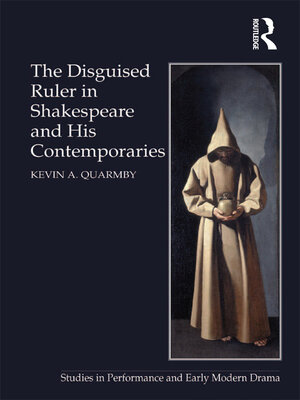The Disguised Ruler in Shakespeare and his Contemporaries
ebook ∣ Studies in Performance and Early Modern Drama
By Kevin A. Quarmby

Sign up to save your library
With an OverDrive account, you can save your favorite libraries for at-a-glance information about availability. Find out more about OverDrive accounts.
Find this title in Libby, the library reading app by OverDrive.



Search for a digital library with this title
Title found at these libraries:
| Library Name | Distance |
|---|---|
| Loading... |
In the early seventeenth century, the London stage often portrayed a ruler covertly spying on his subjects. Traditionally deemed 'Jacobean disguised ruler plays', these works include Shakespeare's Measure for Measure, Marston's The Malcontent and The Fawn, Middleton's The Phoenix, and Sharpham's The Fleer. Commonly dated to the arrival of James I, these plays are typically viewed as synchronic commentaries on the Jacobean regime. Kevin A. Quarmby demonstrates that the disguised ruler motif actually evolved in the 1580s. It emerged from medieval folklore and balladry, Tudor Chronicle history and European tragicomedy. Familiar on the Elizabethan stage, these incognito rulers initially offered light-hearted, romantic entertainment, only to suffer a sinister transformation as England awaited its ageing queen's demise. The disguised royal had become a dangerously voyeuristic political entity by the time James assumed the throne. Traditional critical perspectives also disregard contemporary theatrical competition. Market demands shaped the repertories. Rivalry among playing companies guaranteed the motif's ongoing vitality. The disguised ruler's presence in a play reassured audiences; it also facilitated a subversive exploration of contemporary social and political issues. Gradually, the disguised ruler's dramatic currency faded, but the figure remained vibrant as an object of parody until the playhouses closed in the 1640s.







